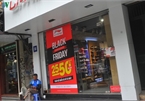 |
|
People choose Vietnamese goods at Sai Gon Co-op Mart in HCM City.
|
A recent survey on 10 years of the 'Vietnamese people prioritise using Vietnamese goods campaign' revealed 88 per cent of Vietnamese had interested in the campaign.
Sixty-seven per cent said they would buy Vietnamese goods, 52 per cent said they recommended relatives buy Vietnamese goods and 36 per cent said they had shifted from buying foreign goods to domestic goods.
However, Nguyen Van Than, chairman of the Viet Nam Association of Small and Medium Enterprises (Vinasme), said that there were still many problems with the campaign.
Supermarkets, trade centres and convenience stores had improved fast but they were mostly in cities and towns, he said.
Additionally, small and micro businesses struggled to get capital, land and construction licences.
Another difficulty was growing competition from foreign distributors in Viet Nam, cutting into the market share of domestic products.
Nguyen Huu Duong, chairman of the management council of Hoa Binh Co Ltd, said that if there were no convenient places to sell products, it would be difficult for domestic enterprises to develop.
Up to 90 per cent of standard trading centres were held by foreign groups, he explained.
For Vietnamese enterprises to survive and thrive, places to introduce and sell products were vital, Duong emphasised.
Each province and district needed at least one trade centre to sell essential commodities produced by Vietnamese enterprises, he said.
Duong also asked for preferential policies on space hiring fees to help local enterprises and farmers.
Tran Anh Tuan, deputy head of the Viet Nam Fatherland Front's movement board, said it was necessary to complete a legal framework to develop modern means for trade.
As 98 per cent of Vietnamese businesses were small and medium enterprises, they faced many difficulties accessing capital.
Therefore, Nguyen Tri Hieu, chairman of Verig consulting council, suggested using peer-to-peer (P2P) lending, allowing fintech companies to connect investors with lending businesses via technology apps.
This would support investors and lending businesses when the banking system was overloaded, he said.
Tran Thi Phuong Lan, deputy director of the Ha Noi Department of Industry and Trade, said the capital city had integrated bringing Vietnamese goods to industrial parks and processing zones with market stabilisation programmes to meet the shopping needs of labourers.
Selling Vietnamese goods in processing zones and industrial parks had brought practical benefits to employees, Lan said, adding that distribution businesses such as Big C, Hapro and Co.opmart had implemented many discount and gift-giving programmes, which attracted a large number of workers to shop.
She said industrial zones needed to work with enterprises in communication and create favourable conditions in tax, space and rental fees.
To promote Vietnamese goods among workers, Le Viet Nga, deputy director of the Domestic Market Department under the Ministry of Industry and Trade, said the ministry had built 104 selling points in 58 locations nationwide, with many near industrial parks and export processing zones.
These models had helped workers in industrial parks save time and money in accessing quality Vietnamese goods, she said.
However, there were still many retailers that were not interested in these programmes.
Explaining this, Nguyen Thi Hai Thanh, deputy general director of Ha Noi Trade Corporation (Hapro), said the programmes did not bring much profit.
To boost the consumption of Vietnamese goods, Dinh Thi My Loan, chairman of the Viet Nam Association of Retailers, asked the Ministry of Industry and Trade and local authorities to develop a long-term strategy to encourage consumers to prioritise Vietnamese goods.
She also advised enterprises to participate in fairs held in industrial and processing zones and to improve the quality of products to win customers' trust. — VNS

M&A situation turns around: VN billionaires take over foreign retailers
Foreign retail groups undoubtedly are a powerful influence in the domestic market. However, Vietnamese retailers are vowing to ‘play big’ to gain the upper hand in the home market.

VN retailers despair as bargins fail to boost business ahead of Black Friday
As fashion stores across Hanoi prepare for the upcoming Black Friday sales, there is growing concern among sellers that consumers seem to lack enthusiasm for the promotional schemes on offer.
 While Vietnamese goods have become more popular in the domestic market, there's still a long way to go before local products rule the roost.
While Vietnamese goods have become more popular in the domestic market, there's still a long way to go before local products rule the roost.